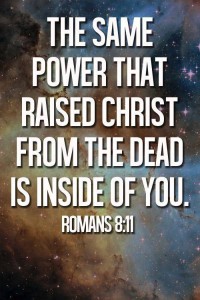13. Living as a World Christian (i)
Looking Inwards - "Christ lives in me...."
In the last lesson we considered the importance of personal transformation in developing a Christian world view.
Without real change inside we will continue to see events and interpret our lives and the world around us in the same way, through the same lenses.
In this lesson we
- describe the difference between "world Christians" and "worldly Christians"
- discuss the futility of trying to change ourselves
- focus on doing the will of God
- reiterate the need for changed thinking
We are called to be world Christians - but not worldly Christians. We need to understand our times and trends, the nature of social change occurring, be astute enough to recognise political correctness and spin, as well as other agendas at work, and be involved in outworking the role of the church in the world/society, while surrendered to the Lordship of Christ and leading of the Holy Spirit in our lives. The key to this entire course is as follows:
"And so, dear brothers and sisters, I plead with you to give your bodies to God because of all he has done for you. Let them be a living and holy sacrifice - the kind he will find acceptable. This is truly the way to worship him. Don't copy the behaviour and customs of this world, but let God transform you into a new person by changing the way you think. Then you will learn to know God's will for you, which is good and pleasing and perfect. (Romans 12:1, 2, NLT, underlines added)
None of this comes intuitively. Both the Bible and experience teach us that we cannot do it in our own strength; only God can give us the power to escape the gravitational pull of the world and live free from its power and deceptions (Ephesians 2:1-10, 2 Peter 2:20a). What the Bible calls "the flesh", the natural us without submission to Christ, will continue to demand its sovereignty in our lives and thinking.
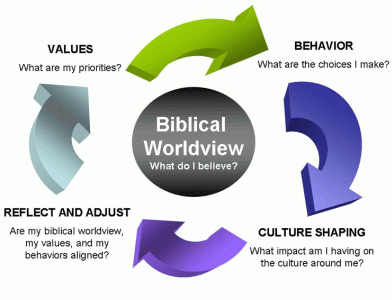
In addition to all that is going on in our heads and driving us, the realities of our spiritual enemies and the "world" around us impact our thinking continuously.
But there is hope ... and it must be God-driven. We need His DNA:
"His divine power has given us everything we need for a godly life through our knowledge of him who called us by his own glory and goodness. Through these he has given us his very great and precious promises, so that through them you may participate in the divine nature, having escaped the corruption in the world caused by evil desires." (2 Peter 1:3, 4)
As Christians, we have a unique faith and lives. We have (thanks to Jesus Christ):
- the presence of God
- certainty now
- a guarantee of eternal life
- grace to forgive our sins, not works
- a reason for living
- freedom from guilt
- freedom from fear of the spiritual world
- a unique family
Over the next two lessons we will look inwards, to see what needs to change in us, and then look outwards, to see how we do so in the context of global changes. If we are open and honest the Holy Spirit will have scope to bring about the kind of changes in us that will enable us to be transformed in line with God's will.
World Christians or Worldly Christians?
The expression "worldly" is a bit out of date. What does it mean? In essence, being "worldly" is being like the world around us (thinking, speaking, listening, acting, interpreting, reacting).
Some Christian communities try to codify what it means to be "worldly "and rate people by standards they derive from their cultural groups. Dressing provocatively, having sex outside of marriage, watching X-rated movies, smoking and drinking, not going to church, swearing and cheating on taxes and hanging around with certain people are all considered worldly. But what about gossiping, causing division, judging others based on external appearances, being proud or selfish, holding onto grudges, and other "lesser" issues that slip under our guard because we do not really consider them to be debilitating sins (but are so in the eyes of God (check out Galatians 5:19-21; read the list in its entirety)?
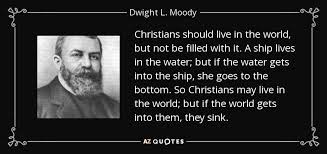
In the world, but not of the world
An acquaintance told me he was committed a life of holiness, so he never watched television, listened to the radio or read newspapers. The only book he read was the Bible. He did not care to know what the politicians were up to. He was ambivalent about going to work each day. His view was that, as God called us to separation, he should take it literally and comprehensively. He had stopped short of going into hiding or seclusion, but was not far from such a step.
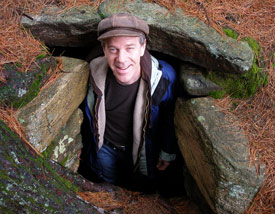
Was my acquaintance correct in avoiding contact with centres of power that could influence his thinking and destabilise his spiritual life, but reduced his witness as a follower of Christ.
We live in the world. We have a range of relationships and commitments, as individuals, spouses, parents, siblings, employers/employees, citizens, customers, friends and neighbours. We interact with a vast array of people with different world views, priorities and behaviours. To what extent should we "get involved" in that world? Consider the following:
"I pray for them. I am not praying for the world, but for those you have given me, for they are yours. All I have is yours, and all you have is mine. And glory has come to me through them. I will remain in the world no longer, but they are still in the world, and I am coming to you. Holy Father, protect them by the power of your name, the name you gave me, so that they may be one as we are one. While I was with them, I protected them and kept them safe by that name you gave me. None has been lost except the one doomed to destruction so that Scripture would be fulfilled. I am coming to you now, but I say these things while I am still in the world, so that they may have the full measure of my joy within them. I have given them your word and the world has hated them, for they are not of the world any more than I am of the world. My prayer is not that you take them out of the world but that you protect them from the evil one. They are not of the world, even as I am not of it. Sanctify them by the truth; your word is truth. As you sent me into the world, I have sent them into the world. For them I sanctify myself, that they too may be truly sanctified." (John 17:9-19)
"... keep oneself from being polluted by the world" (James 1:27)
"Do not be yoked together with unbelievers. For what do righteousness and wickedness have in common? Or what fellowship can light have with darkness? What harmony is there between Christ and Belial? Or what does a believer have in common with an unbeliever? What agreement is there between the temple of God and idols? For we are the temple of the living God. As God has said: 'I will live with them and walk among them, and I will be their God, and they will be my people.' Therefore, 'Come out from them and be separate, says the Lord. Touch no unclean thing, and I will receive you. And I will be a Father to you, and you will be my sons and daughters, Says the Lord Almighty.' " (2 Corinthians 6:14-18, cf Isaiah 52:11).
There is distinction between living in the world (our physical space) and being of the world (our allegiances). We are bombarded by opinions from political parties, commercials, 24-hour news cycle, Facebook, slogans, business interests, leaders, family members.. World views competing for our head space are all around us. It is easy for us to adopt such views unquestioningly.
Separated but not Separate?
The Amish in the United States are an Anabaptist Christian denomination, with roots in 17th century Switzerland, who are known for their separation from society (on Christian grounds) and their rejection of most recent technology. They are famous for eschewing modernity, in order to remain pure and (literally) unconnected to the modern world. They stand out against the background of fiercely individualistic American culture. Like goldfish in a bowl the Amish live in their communities, while tourists from around the world come to observe them being separate.


The Amish are not alone in pursuing separateness. When I lived in Lebanon (2000-2003) I occasionally visited a Christian area in the north of the country where monks and ascetics have lived in caves for generations; people come to observe them from afar as they practice their separation from the world, almost like a spiritual apartheid (separate development). I have seen other like communities in Europe.
Jesus calls us to live Godly lives, but He does not call us to isolation. Prayer and Bible reading make Christians stronger. Relating to the Body of Christ makes Christians stronger. Making the right decisions and staring down temptation makes Christians stronger. Isolation does not make us stronger. Some believers choose isolated lives, eg in monasteries, for a range of reasons (study, contemplation, prayer, silence, focus), but that is not the norm.
In fact, the scope of "Christian" communities in our world could cause us to be pessimistic about the possibility of any real change. Consider the range.
| monastic | - | social concern/caregiving |
| holiness | - | charismatic |
| liturgical | - | exclusive/isolationist |
| contemplative/mystical | - | traditionalist/conservative/Calvinistic |
| evangelical/missional | - | apostolic |
| sensate/enthusiastic | - | liberal |
| activist | - | parachurches/issues-based |
| ascetic | - | cults/sects |
Fortunately, branding does not define us. Our identity and hope reside only in Christ. Only He can re-shape our thinking so that we authentically reflect Him.
The Futility of Trying to Change Ourselves
We have a preoccupation with self. This is demonstrated by the position of "king of the house" we learn suits us as babies. We have inflated estimates of our ability to change, by our own power. We do not see the strength of our preoccupations with individualism, material comforts and personal security ("my life, my car, my time, my future, my values, my plans"). We seek to change our behaviours, but become frustrated when this proves to be more difficult than we had imagined. We do not realise that me-ism is a lens through which we judge the world around us leads to a spiritual vacuum and powerful habits that we cannot break in our own strength.
Romans Chapter 7 is Paul's classic description of the struggle of the individual Christian to try to keep the laws of God while facing the reality of sin in our lives. The answer lies in Chapter 8; it is the life we have in Christ, with the help of the Holy Spirit.
The Bible teaches (and we know from experience) that human heart is "deceitful, fraudulent" (Jeremiah 17:9). Only Christ can truly free us. Only He can impact our human DNA, by giving us God's DNA (2 Peter 1:4). Only He can enable us to live in a way that pleases God, free from the traps of sin, selfishness, bad attitudes, disobedience, and so on. And only our allegiance to Him can resolve the riddle of how to live in the world without being sucked in and becoming like it.
Our struggle is not an emotional or intellectual one; it is not even a matter of willpower; it is a spiritual conflict that requires the power of God. Only submission to the Lordship of Jesus Christ (enabled by the Holy Spirit, see 1 Corinthians 12:3b) sets us free from submission to the lordship of others.
As Christians, sin no longer has any authority to dominate us (cf John 8:34). Our will has been set free from slavery. Our responsibility as Christians is to maintain the freedom that God has made possible for us from the sinful nature of the old self. The new nature that we have received desires to do the will of God; it is completely at odds with our old nature.
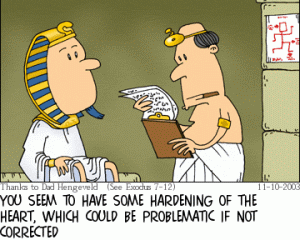

In view of the fact that we have been set free, Paul says, "Let not sin therefore reign in your mortal body" (Romans 6:12). The word "reign" is basileuo, which means 'to exercise kingly power'. It could be translated, "stop allowing the sinful nature to reign as king in your body". We should not allow sin to have dominion over us. The choice is ours to present our bodies as living sacrifices to God.
Our minds and bodies can be weapons used by the enemy for our destruction; or used by the Holy Spirit for His purposes and honour. Our will is involved; we make the choice.
"Live by the Spirit, and you will not gratify the desires of the sinful nature (Galatians 5:16).
"Those who belong to Christ Jesus have crucified the flesh with its passions and desires." (Galatians 5:24)
We will not fulfil the desires of the flesh if we walk in obedience to the Holy Spirit and consider that when Jesus Christ was crucified our old life died also there, with Him.
Doing the Will of God
"I desire to do your will, my God; your law is within my heart." (Psalm 40:8)
Over many years, I have observed that believers everywhere struggle with understanding and walking in the will of God. This is not the place to explore the topic of the will of God in detail, except to say that if we are living in active, deliberate, prayerful submission to Christ and obeying His leading and direction in our lives we will experience the inner change that is necessary to bring our thinking into line with God's. That will give us confidence and assurance as we deal with the complexities and variableness of modern life. Jesus addressed every issue in the context of obeying His Heavenly Father (John 4:34; 12:49; Hebrews 5:8).
As the Psalmist indicated above, if our desire is to do the will of God He will write his law in our heart; if the heart is the centre of our desires, our thinking will be re-aligned to match God's thinking = we will have a truly Christian world view.


Make it a practice to submit yourself to Him every day.
"O Lord, I give my life to you." (Psalm 25:1, NLT)
"I entrust my spirit into your hand. Rescue me, Lord, for you are a faithful God." "My future is in your hands" (Psalm 31:5, 15 NLT)
Experiencing Changed Thinking
"Lord, the God of our fathers Abraham, Isaac and Israel, keep these desires and thoughts in the hearts of your people forever, and keep their hearts loyal to you." (1 Chronicles 29:18)
A Christian world view can only come from renewed thinking. James uses a good analogy:
Can both fresh water and salt water flow from the same spring? (James 3:11)
Take time out to think about your loyalties and desires and what the Lordship of Christ means in your life. Can you pray, "Lord, I give my life to you"? Are there areas you have not surrendered?
"Set your minds on things above, not on earthly things." (Colossians 3:2)
"We fix our eyes not on what is seen, but on what is unseen, since what is seen is temporary, but what is unseen is eternal." (2 Corinthians 4:18)
As Christians, we live in the world. God knows what we need. But we are to live as though the more important thing is the Kingdom of God and our eternal destiny.
The role of "repentance" (Greek: metanoia) is to change our minds (or hearts).
In some circumstances, change can only come about when areas of sin in our lives are exposed and dealt with (consider what the Ephesian converts had to do, see Acts 19:18-20).
- Develop (and stick to) a daily practice of reading and meditating on God's Word, His revealed truth. Even committed Christians often have differing views about issues. God's Word gives us clarity, confidence, authority and a common ground.
- Learn to listen to the voice of the Holy Spirit, leading you, prompting, correcting, nudging, giving you ideas, wisdom and clarity. He will not abandon you. "He lives with you and will be in you." (John 14:18). If you learn to listen to Him in quiet times you will recognise Him in the storm, and the cacophony of everyone's opinions.
- Obey God's Word and the Holy Spirit. Change is facilitated by doing. Stubbornness is reinforced by resisting and not doing. "Do whatever He tells you." (John 2:5)
We do not grow by applying spiritual principles alone, but by the Gospel and the presence of Christ in our lives. He is the one who gives us purpose and meaning for this life and eternity.
A common complaint is, "I do not have enough time". Really? I recently sat on a train and watched a group playing games on their iPods; one of them turned to her friend, who was updating her diary about a trip the group had just made to Aachen Cathedral, and asked "How do you have time to write in a diary?". Self-evidently, we all have time for Bible reading, prayer and listening to the Holy Spirit; we just need to recognize its importance and do it.
You may be the only Christian in your immediate world. You may find it difficult standing alone as a follower of Christ. With God's help you can approach life with a Biblical world view, reflecting His perspective, and live effectively as a "world Christian".
